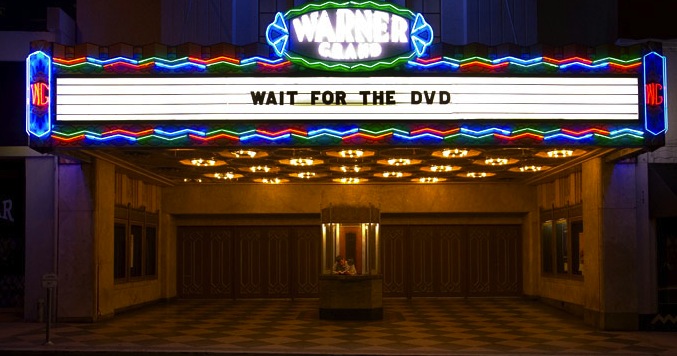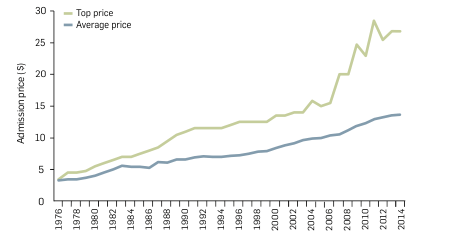
The cost of a movie ticket could set you back from anywhere between $8-$40. The price may vary due to many different factors, such as, which cinema you choose, what day you see the movie, use of vouchers or other discounts and which format you choose to see the movie in (IMAX, 3D or Gold Class).
In figure 1.1 we can see data collected from Motion Picture Distributors Association of Australia (MPDAA) . It shows a constant price increase of cinema ticket prices from 1976-2014. Presumably, it could be said that movie tickets will continue to increase each year, but will consumers continue to pay?
 Figure 1.1
Figure 1.1
Price Sensitivity
Cinema exhibitors believe that movie-goers will continue paying for movie tickets as long as they feel they are receiving a better quality experience than at home. Customers are “willing to pay a premium price for a premium experience to make the investment worthwhile” (Quinn, 2014). However, there are a lot of ways to avoid paying top dollar for movies, such as film piracy, cheaper and independent cinemas and other discounted movie options. This suggests consumers are becoming more price sensitive when it comes to purchasing movie tickets.
When consumers are price sensitive to a product, that is, when they question how much they are willing to pay for something, it is normally a luxury item rather than a necessity, with many possible substitutes available (Iacobucci 2013, p.110). When a product is placed at a high price, customers’ will either assume the brand is of high quality and therefore reasonably priced or they will think the firm is being greedy and trying to rip-off its customers. It could be argued that Australia has the right to question the Australian cinema industry leaders such as, Village Cinemas and Hoyts. Compared to other independent Australian cinemas or even cinemas in America, their cinema ticket prices are much more expensive.
The exhibition industry justify the price increase for cinema tickets through (Coate and Verhoeven, 2014):
(1) High labor costs involved in operating a cinema in Australia compared to other countries.
(2) The impact of illegal downloading.
(3) Lower attendance.
Dual Entitlement and Attribution Theory.
According to the dual entitlement theory, consumers feel that it is fair for a firm to raise prices when faced with increasing costs (Kahneman et al., 1986). Therefore, if customers are aware of the three factors mentioned by the exhibition industry they may be more accepting of price increases. The dual entitlement concept is also backed up by attribution theory.
Attribution theory states that people are likely to search for a causal explanations for an event when the event is surprising and/or negative (Folkes, 1984). This suggests, customers often look for explanations as to why a company has increased its prices, often concluding whether or not these explanations are valid or invalid. Offering an explanation for price increases could also possibly reduce the perception of price unfairness (Urbany et al., 1989). However, a cinema would not usually provide information up front as to why they have raised their ticket prices. A customer would have to ask for this kind of information and one can assume the employee at the candy bar would not know.
So now the customer is left with a few different options, they either pay full price for a movie ticket, hunt for the cheaper option (discount tickets/ independent cinemas), illegally download the film at home or wait for the dvd/ blu-ray to be released. With an array of different alternatives to choose from it is understandable for consumers to be price sensitive when buying a movie ticket. The leaders in the cinema industry must tread carefully if they wish to uphold attendance, they may just loose customers who continue to question their price increases each year.
Meher Chubb (mchubb08)
mchub@deakin.edu.au
211336178
References:
Coate, B. and Verhoeven, D. (2014). Only at the movies? Home truths about cinema ticket pricing. [online] The Conversation. Available at: http://theconversation.com/only-at-the-movies-home-truths-about-cinema-ticket-pricing-25820 [Accessed 29 Apr. 2016].
Folkes, VS 1984, ‘Consumer Reactions to Product Failure: An Attributional Approach’, Journal Of Consumer Research, 10, 4, pp. 398-409, Business Source Complete, EBSCOhost, viewed 30 April 2016.
Iacobucci, D. (2013). MM4. Mason, OHIO: South-Western, Cengage Learning, p.199
Kahneman, D., Knetsch, J. and Thaler, R. (1986). Fairness as a Constraint on Profit Seeking: Entitlements in the Market. The American Economic Review, [online] 76(4), p.728. Available at: http://www.anderson.ucla.edu/faculty/keith.chen/negot.%20papers/KahnKnetThal_FairProfitSeek86 [Accessed 30 Apr. 2016].
Quinn, K. (2014). A cinema ticket in Australia can cost up to $40. Here’s why. [online] The Sydney Morning Herald. Available at: http://www.smh.com.au/entertainment/movies/a-cinema-ticket-in-australia-can-cost-up-to-40-heres-why-20140710-zt3g0.html [Accessed 29 Apr. 2016].
Urbany, J, Madden, T, & Dickson, P 1989, ‘All’s Not Fair in Pricing: An Initial Look at the Dual Entitlement Principle’, Marketing Letters, 1, 1, pp. 17-25, Business Source Complete, EBSCOhost, viewed 1 May 2016.